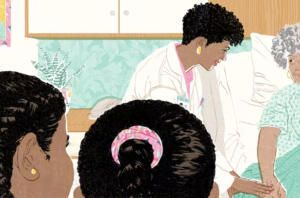The new film explores the path of the president’s mentor from relentless aggressor to unwilling victim.
In the late 1980s, when Tony Kushner was in the process of writing Angels in America,Kushner and the show’s co-director Oskar Eustis went to visit the AIDS Memorial Quilt, which had gone on display for the first time at the Moscone Center in San Francisco. Amid the thousands of panels was one dedicated to the lawyer Roy Cohn. Underneath Cohn’s name, which was inscribed in plain black letters and enclosed inside a tight rectangular frame, were three words: bully. coward. victim. “Tony looked at it,” Eustis later remembered, “and said, ‘If I can write something half as dialectical as that, it’ll be a great character.’”
Cohn possessed inherently theatrical qualities even before he was immortalized in Angels: the naked venality, the emotionless gaze, the hypocrisy and latent self-hatred. Cohn was a homophobic gay man and a Jew who persecuted other Jews during the anti-communist witch hunts of the ’50s. His most famous acolyte was Donald Trump, to whom Cohn attached himself as a mentor during the ’70s, teaching the budding real-estate mogul and future president his own personal code for winning: Dominate in every interaction, never admit wrongdoing or defeat, never pay your bills, and sue anyone who objects to your behavior into financial submission. (This week alone, Trump’s Justice Department has filed a lawsuit against his former national security adviser John Bolton over Bolton’s forthcoming book, The Room Where It Happened, and the president is reportedly considering similar action against his niece, Mary Trump, whose own book about him is slated for release in July.)
Read: The epic grift of ‘Dirty Money’
The mystery of the 45th president’s psyche, at this point, is as all-encompassing as it is not really a mystery at all—Trump provides daily reminders of his pathological narcissism, his emotional fragility, his intellectual incuriosity, and his dearth of empathy. And yet seeing what helped make him this way can be instructive, for cautionary value if nothing else. Bully. Coward. Victim. The Story of Roy Cohn, which airs on HBO tonight, is a fascinating addition to the canon for Trumpologists, but it’s also an observation of all the damage damaged people can cause. If the movie tends to dart around Cohn as a subject rather than fully expose him, it captures in emotional detail the enduring chaos and grief he inflicted on others.
Bully. Coward. Victim. is directed by Ivy Meeropol, whose paternal grandparents were Julius and Ethel Rosenberg. In 1951, when Cohn was barely 24 years old but already an assistant U.S. attorney for the state of New York, he played a central role in the Rosenbergs’ espionage trial, relentlessly lobbying the judge for their execution. After both were found guilty of passing information to the Soviet Union and electrocuted at Sing Sing in 1953, their two sons were adopted by the songwriter Abel Meeropol and his wife. Michael Meeropol, Ivy’s father, is a haunting presence in the film, showing up intermittently in archival footage and interviews with his daughter to represent the human toll of Cohn’s earliest power games.
Some people who knew Cohn, even members of his own family, are unsparing in their judgments. “He was the personification of evil,” the journalist David Lloyd Marcus, Cohn’s cousin, declares in the film, adding, “Every family has their own Roy Cohn.” “Oh, I hope not!” Marcus’s mother gasps in response. “The world would be a terrible place.” But unlike the 2019 documentary Where’s My Roy Cohn?, which delved into Cohn’s upbringing in more detail, Bully. Coward. Victim. neglects to examine the forces that might have shaped him, giving the impression instead that he had sprung into adult life fully formed. He graduated from law school at age 20, before finding early notoriety via the Rosenberg trial, and later working for Joseph McCarthy’s anti-communist Senate subcommittee. “He had to be the tough guy always in the room,” Marcus explains. “He had to be the one who was the most macho.”
Meeropol, though, resists the idea that Cohn was a simple villain, laying out a portrait of someone who was apparently as charismatic and well connected as he was amoral. She seems more interested in the impressions he left on others, and in the strangeness of Manhattan society during the ’70s and ’80s, which embraced Cohn whether he was stopping by the 21 Club or the riverside parking lots he reportedly co-owned with the mob. Post-McCarthy, Cohn spent 30 years as an attorney in New York City, representing clients such as George Steinbrenner and John Gotti. Cohn wore tiaras to Studio 54; he appalled John Waters with his summertime presence in Provincetown (“I wouldn’t have had my nostril on the same straw as that pig,” Waters huffs in the movie’s most entertaining quote); he helped Rupert Murdoch get a New York Post interview with the Mafia boss Carmine “The Cigar” Galante. He told people he was engaged to Barbara Walters, a frequent date, even as he later took Peter Fraser, his lover toward the end of his life, to the White House and posed for a picture with him and Ronald and Nancy Reagan. (Parading his much younger boyfriend around an event hosted by a famously homophobic administration was a typically Cohnian assertion of power.)




